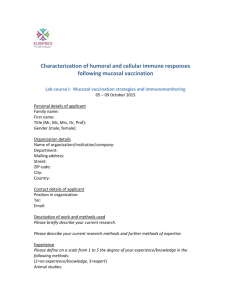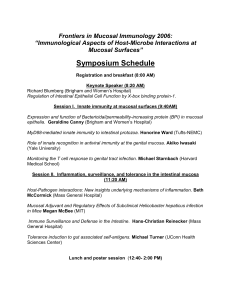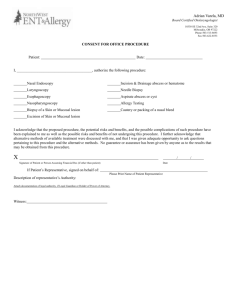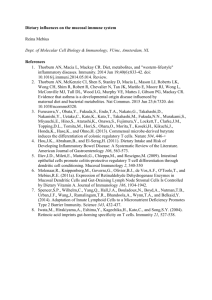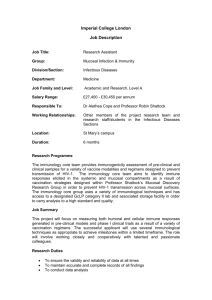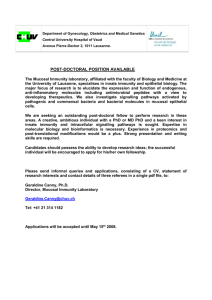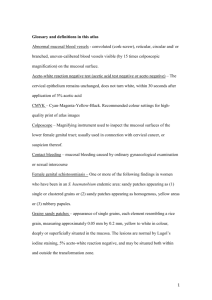Course Description
advertisement
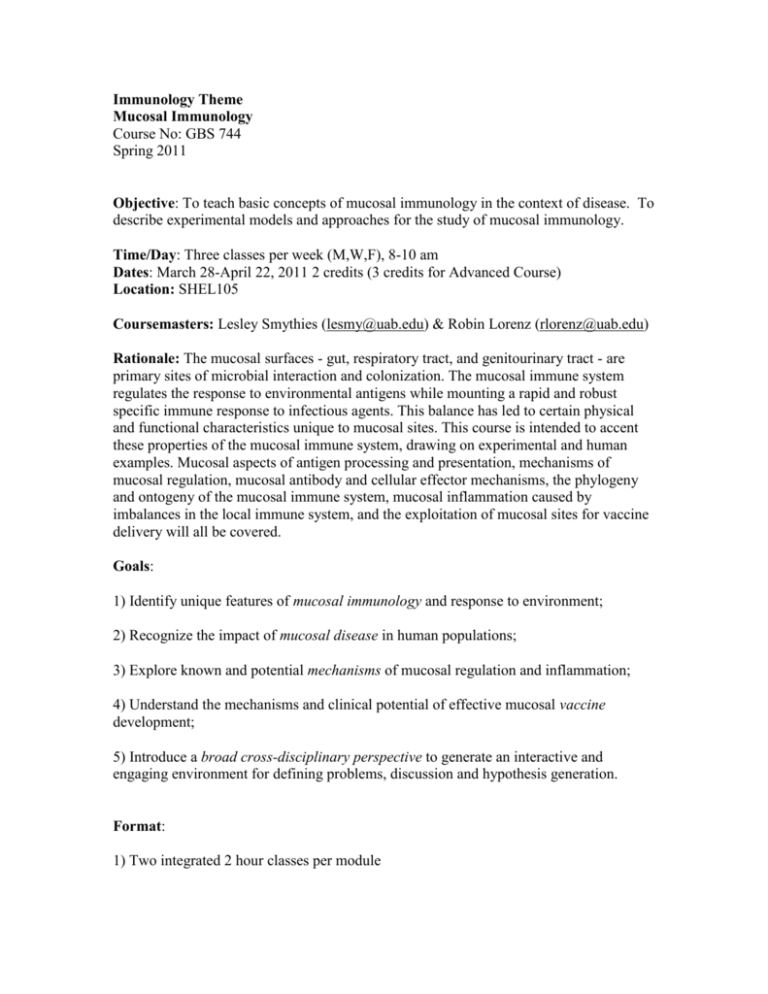
Immunology Theme Mucosal Immunology Course No: GBS 744 Spring 2011 Objective: To teach basic concepts of mucosal immunology in the context of disease. To describe experimental models and approaches for the study of mucosal immunology. Time/Day: Three classes per week (M,W,F), 8-10 am Dates: March 28-April 22, 2011 2 credits (3 credits for Advanced Course) Location: SHEL105 Coursemasters: Lesley Smythies (lesmy@uab.edu) & Robin Lorenz (rlorenz@uab.edu) Rationale: The mucosal surfaces - gut, respiratory tract, and genitourinary tract - are primary sites of microbial interaction and colonization. The mucosal immune system regulates the response to environmental antigens while mounting a rapid and robust specific immune response to infectious agents. This balance has led to certain physical and functional characteristics unique to mucosal sites. This course is intended to accent these properties of the mucosal immune system, drawing on experimental and human examples. Mucosal aspects of antigen processing and presentation, mechanisms of mucosal regulation, mucosal antibody and cellular effector mechanisms, the phylogeny and ontogeny of the mucosal immune system, mucosal inflammation caused by imbalances in the local immune system, and the exploitation of mucosal sites for vaccine delivery will all be covered. Goals: 1) Identify unique features of mucosal immunology and response to environment; 2) Recognize the impact of mucosal disease in human populations; 3) Explore known and potential mechanisms of mucosal regulation and inflammation; 4) Understand the mechanisms and clinical potential of effective mucosal vaccine development; 5) Introduce a broad cross-disciplinary perspective to generate an interactive and engaging environment for defining problems, discussion and hypothesis generation. Format: 1) Two integrated 2 hour classes per module 2) Usually, the first class of the module will have two related 45-minute faculty presentations, 10 minutes discussion per presentation and a 5 to 10 minute break 3) The second class of the module will be student-led presentations. Each student will present once in the course. Each student will be allowed to pick the paper they present from the papers uploaded to the blackboard site. However, each paper can only be presented once – so all the students assigned to present during a specific module will need to contact each other to determine who is presenting which paper. You may present either a review or a primary data paper. If you present the primary data paper, then utilize the reviews for your background. Each group of presenters will notify the class of their choices for presentation the class meeting before the presentation occurs (this will allow the students who will lead the discussion to know which papers to read) 4) Following each student presentation, there will be a 10 minute discussion led by three designated students. The students assigned to lead the discussion will be the students who did presentations in the previous module (i.e. if you present in module 1 – you will lead the discussions for module 2, etc). The module 1 discussions will be lead by the module 6 presenters. 5) Everyone in class will be responsible for turning in the written HW to the coursemasters by noon the day prior to class (via e-mail to Lesley Smythies (lesmy@uab.edu)). These homework answers will be used to help guide discussions. 6) All reviews and research papers used in the course are chosen by the course faculty. Each module will be focused on a single theme but covering topics in the gastrointestinal tract and respiratory and genitourinary systems. Written Homework: Each student will choose one paper from the assigned reading for each module for their written homework assignment. Please choose one of the papers that will be presented during the module. * Students need to read all assigned paper(s) prior to attending class. However, they need to write 4 very brief paragraphs (each with a maximum of 3 non-run-on sentences) answering the following questions about one of the papers assigned for that module (please identify the paper used for HW by title and first author): a) What was the main take-home message of the paper? b) What part did you find the least convincing or the most confusing? c) After reading the paper, what would you want to do next? d) After reading the paper, what question would you ask the author? Course Web Site: Information pertinent to the course, including the course syllabus, schedule, and reading assignments will be posted on the GBS 744: Mucosal Immunology website. This website will also be used to post announcements. Students are also encouraged to use e-mail to communicate with faculty, as needed, during the course. Please see the separate instructions to access the course Web site. Evaluation Policy (100 total points): Evaluations will be based on student presentations (30 points), weekly written homework (30 points), participation in the discussions of other student presentations (20 points) and attendance (20 points). There are no exams. Attendance Policy: Attendance is required for all regularly scheduled classes unless prior arrangements are made with the coursemaster, or in the event absence occurs as a result of illness. We expect and insist on professional behavior by our students. Course Evaluations: Students will be given the opportunity to evaluate the course regarding content, faculty, and overall presentation at the end of the course. Additional Requirements if taking class for Advanced Credit (30 additional points): Students taking this course for advanced credit will be required to write three parts of a hypothesis-driven grant. This cannot be on a topic previously used by the student for any other course requirements, fellowship applications, or qualifying exams. It also cannot be on a project already proposed by the student’s laboratory (i.e. from the mentor’s grant). See handouts for specific instructions. -Grant idea (2-3 bullet points) DUE Friday, April 8, 2011 -One page specific aims DUE Friday, April 15, 2011 -One-half page significance DUE Friday, April 22, 2011 2011 Topics: B-lymphocytes and genitourinary mucosa – Mestecky/Novak/Moldoveanu Mucosal Inflammation: Pulmonary Schwiebert/Chaplin T Lymphocytes (regulatory)– Elson/Mannon Mucosal Infections and Innate Immunity – Smith/Smythies Mucosal Immunity and Vaccines – Fujishashi/Michalek T Lymphocytes (effector/)– Weaver/Harrington
